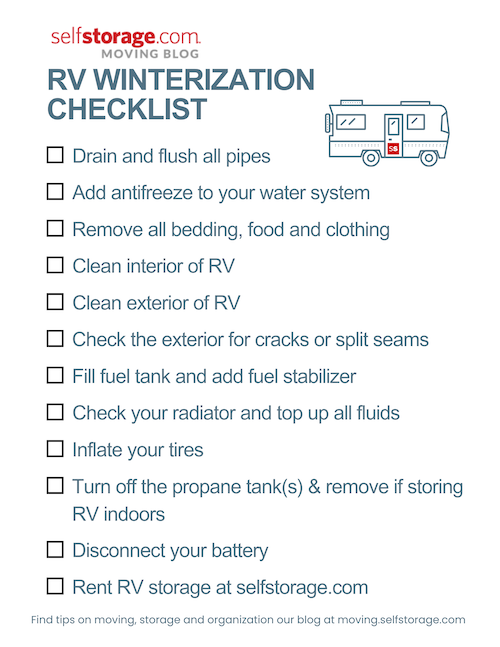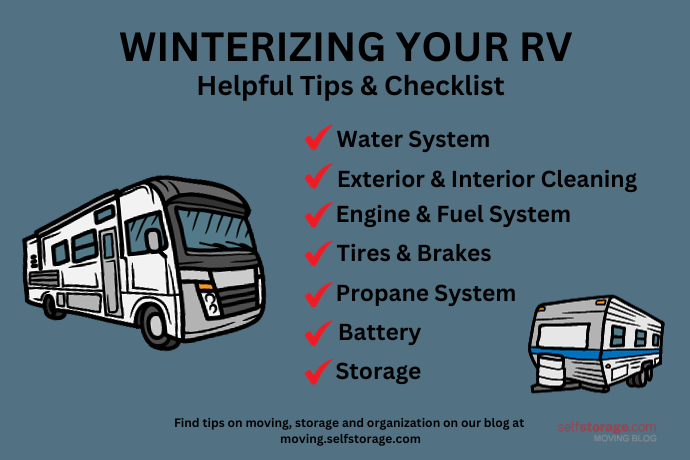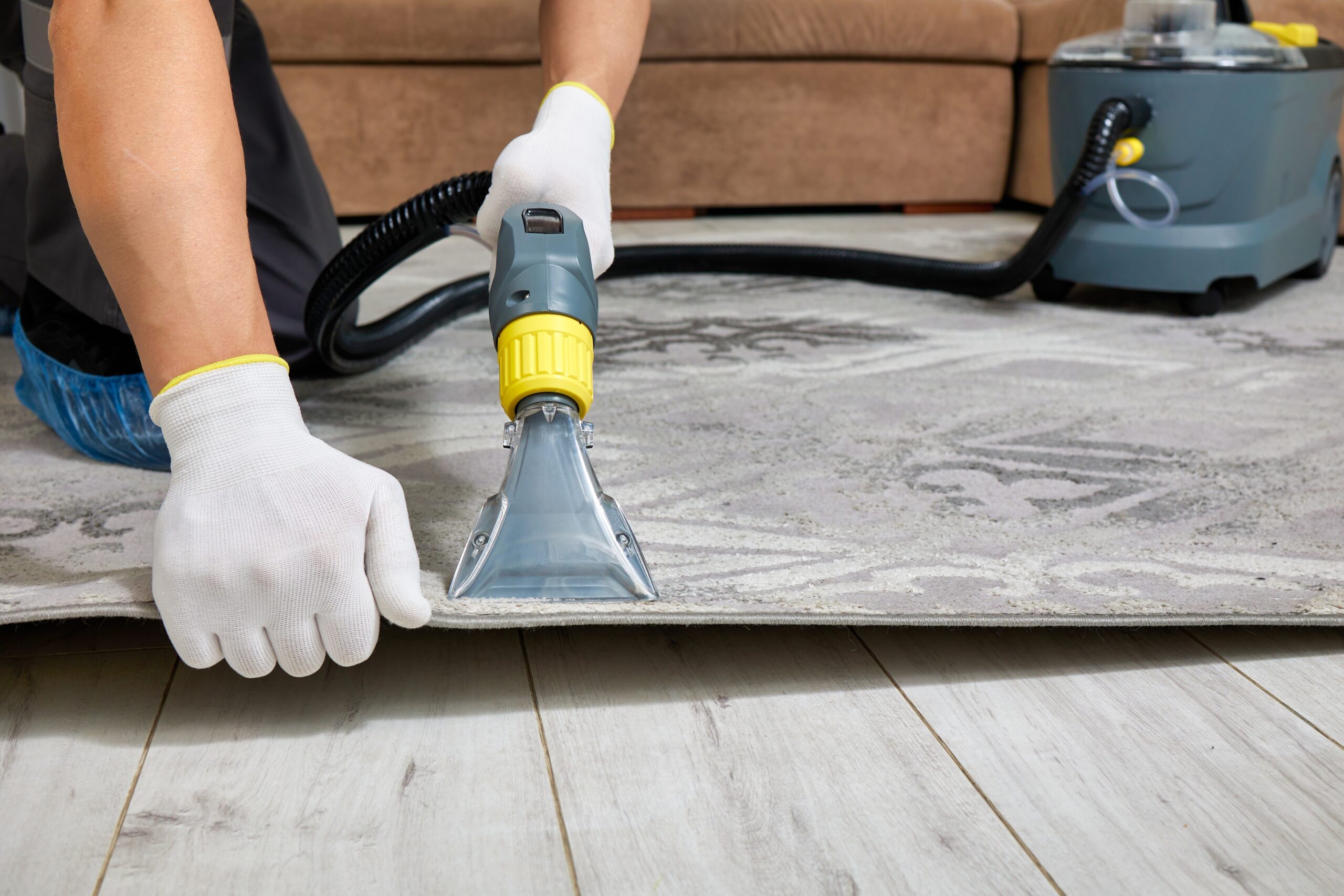What’s covered in this article – click on a link to learn more:
- Water System
- Cleaning
- Engine & Fuel System
- Tires & Brakes
- Propane System
- Battery
- Storage Options
- Printable Winterizing Checklist
As the summer camping season winds down, most travel buffs reminisce about their best trips, look through photos taken along the way and start planning their visits to next year’s must-see spots. But something EVERY camper should do at season’s end is winterize their RV or camper.
This comprehensive blog will break down the crucial steps in winterizing your RV. We’ll cover everything from cleaning, the battery, tires, breaks and storage to the water, engine, fuel and propane systems. And once you check everything off your winterization list, the only thing you’ll have to worry about come spring is maximizing your storage space to fit more snacks!
Winterize RV Water System
The number one reason you want to fully winterize your water system is to avoid cracked pipes. Here are the steps to get every drop of water out of your recreational vehicle:
- Make sure the water heater is turned off.
- Bypass the water heater. Your RV will likely have a bypass installed, but check your owner’s manual to be sure.
- Drain and flush all pipes. Ensure that all faucets are open while draining.
- Fill the water system with antifreeze and pour it into all the drains as well.
- Do you have extras like an ice machine or a dishwasher? If so, carefully check your owner’s manual, as those items may require a few extra steps.
RV Exterior and Interior Winter Cleaning
Proper cleaning of your RV and camper’s exterior and interior is crucial before the cold winter months arrive. Not only will you maintain the appearance of your camper, but you’ll also be ensuring its functionality.
Here’s what you can do to thoroughly clean your RV and increase its longevity:
INTERIOR CLEANING:
- Remove all linens, towels and clothing.
- Lift and prop up couch cushions and mattresses to allow optimal airflow.
- Remove all food and beverages to prevent pests.
- Inspect for and remove mold and mildew.
- Empty and clean out all storage spaces.
- Place an open box of baking soda inside the fridge to absorb moisture.
- Use drying agents in cupboards and corners to reduce humidity or consider purchasing an RV dehumidifier for extra protection.
EXTERIOR CLEANING:
- Remove items from, then clean all exterior storage spaces.
- Clean and dry the RV’s exterior, inspecting for cracks or split seams.
- Use a sealant to patch up any gaps.
- Apply a high-quality wax or protectant.
- Clean and dry the awning to prevent mold growth.
- Cover exterior vents to prevent ice, snow or pests from entering.
Winterize RV Engine and Fuel System
Your engine is the heart of your RV, so protecting it is vital. When it comes to protecting your RV’s engine and fuel system in the off-season months, there are three simple steps:
- Fuel Tank Protection: Before storing your RV for the winter, fill up the fuel tank. A full tank will help prevent moisture buildup.
- Add a Stabilizer: Add a reliable fuel stabilizer to prevent engine damage. Let the engine idle to allow the stabilizer to circulate through the system.
- Check the Radiator and Fluids: Top off your radiator with the appropriate RV antifreeze suitable for your climate. If you live somewhere with extremely frigid temperatures, consider flushing and replacing with an antifreeze suited for extreme conditions. Also, inspect and refill your fluid levels: windshield wiper fluid, oil and brake fluid.
Winterize RV & Camper Tires and Brakes
Keeping your tires and brakes in tip-top shape is the number one way to ensure safe, smooth travels. It’s also one of the simplest winterization steps. Here is all you need to do:
TIRES: Keep your tires inflated to your vehicle manual’s specifications. They should also be covered with a UV reflective cover to prevent sun damage if stored outside. For an extra layer of protection, consider jacking your RV off the ground. This will remove thousands of pounds of pressure from the tire.
BRAKES: Before storing your RV, have a professional complete a brake inspection. And as previously mentioned, check your brake fluid and top it off if needed.
Winterize RV Propane System
When you’re getting your RV ready for winter, it’s easy to overlook the propane system, but trust us, it’s a big deal. Before putting your rig away, drain the lines and turn off the propane tank completely. If you’ve got more than one tank, don’t forget to close them all up.
If you’ll be storing your RV indoors over the winter, the propane tanks should be removed. Store the tanks upright in a well-ventilated area.
Winterize RV Batteries
Colder temperatures can wreak havoc on your RV’s battery. Taking proper precautions is vital to ensuring it’s ready for the road in spring. Here’s a checklist of what you can do to winterize your battery:
- Turn off your RV’s disconnect and breaker switches.
- Disconnect your battery, ensuring to remove the negative cable first.
- Remove single batteries and store them fully charged in a warm, dry environment. Consider using an RV battery trickle charger to maintain your battery’s charge while in storage.
- If your RV has multiple batteries, it’s best to keep them installed. Disconnect the negative battery cable and check the charge level throughout the winter. If necessary, recharge the batteries.
- If you have lead-acid batteries, clean them with baking soda and water before storage to remove corrosion.
- Don’t use or charge your battery if temperatures drop below 30° F.
Indoor and Outdoor RV Storage Options
You’ve got a few options when it comes to storing your rig when it’s not in use. Let’s look at the pros and cons of each.
Indoor Storage
Pros
- Protection from harsh weather conditions and pests.
- Protection from vandalism or theft.
- Reduced wear and tear.
- Paint and overall appearance will be maintained out of the sun’s UV rays.
- Extended lifespan.
- The option of RV storage with electricity.
Cons
- You may have limited accessibility to your RV based on operating hours and company policies.
- Indoor storage can cost more than storing your RV outdoors.
- Finding storage space in peak seasons may be challenging.
Outdoor Storage
Pros
- You’ll likely pay less when storing your RV outdoors.
- It’s relatively easy to find outdoor storage space for RVs.
- Accessibility shouldn’t be a problem.
- No having to reserve space months in advance.
Cons
- Exposure to the elements may lead to wear and tear.
- Increased maintenance including more repairs and cleaning due to exposure to weather and UV rays.
- Decreased security may lead to vandalism or theft.
RV and Camper Winterizing Checklist
In a nutshell, to keep your RV or camper in peak condition, ensuring many more years of exciting adventures, do the following each time you put it in storage:
- Drain and flush all pipes.
- Add antifreeze to your water system.
- Remove all bedding, food and clothing, then thoroughly clean your RV’s interior and exterior, including the storage spaces.
- Check the exterior for cracks or split seams.
- Fill your fuel tank and add a fuel stabilizer.
- Check your radiator and top up all fluids.
- Inflate your tires and consider using UV-reflective tire covers if you’re storing your RV outdoors.
- Check your brakes.
- Turn off the propane tank(s) and remove if you’re storing your RV indoors.
- Disconnect your battery. Remove single batteries and store in a warm, dry environment and consider using a trickle charger. Keep multiple batteries charged and connected.
- Choose carefully between indoor and outdoor storage for your RV.

Your recreational vehicle isn’t just one of the most significant purchases you’ll make in your lifetime. It’s the vessel that leads you to new destinations, takes you on awe-inspiring adventures and allows you to build memories you’ll cherish and share for years. These are all priceless reasons to keep it in the best shape possible for as long as you can.
We encourage you to follow these steps each time you store your rig to ensure it’s road-ready for your next road trip. If you’re more of a visual learner, you can also check out this comprehensive video on RV winterization tips from All About RV’s.







